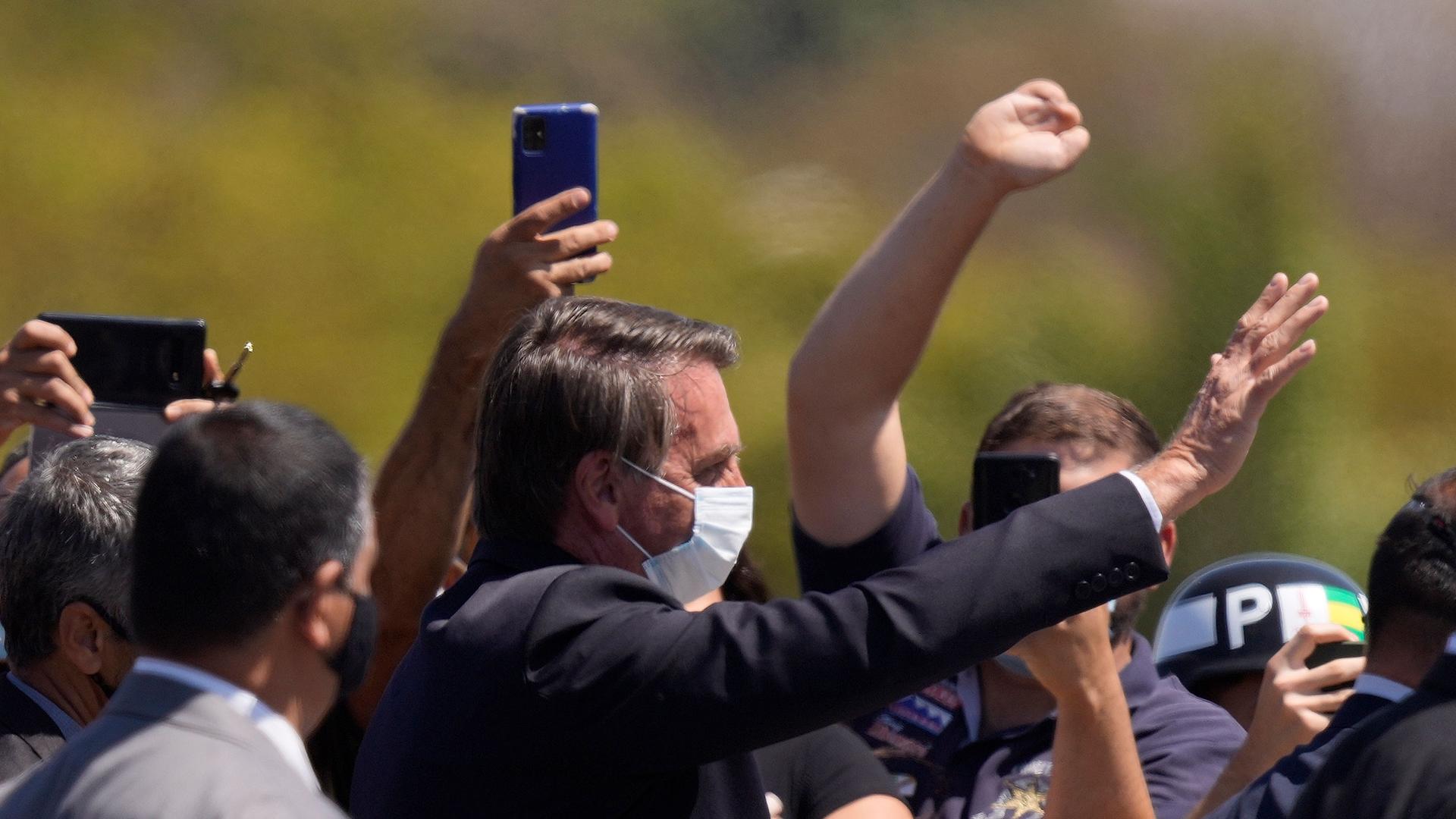Bolsonaro rallies his base with voter fraud claims ahead of elections in Brazil
Brazil’s voting system is seen as a model abroad. Elections are organized at the national level, and overseen by an Electoral Court. The country has been using electronic voting machines since 1996. And results are often reported within hours.
But Brazilian President Jair Bolsonaro says the entire system is rife with fraud.
“There are a handful of members of the Electoral Court and they maneuver all of this,” he said during one of numerous public statements in late July. “There have been complaints of fraud since 2008,” he said. “We can’t continue to let this happen.”
Bolsonaro hasn’t shown any evidence.
Related: Brazil’s soy boom takes a toll on traditional farming communities
Political scientist Cíntia Pinheiro Ribeiro de Souza said his claims are baseless.
“Brazil’s electronic voting system has been in place for more than 20 years. …It’s won awards. It’s proven to be secure and efficient, and we have never had any evidence of fraud or any sign of anything that would invalidate the electoral system.”
“Brazil’s electronic voting system has been in place for more than 20 years,” she said. “It’s won awards. It’s proven to be secure and efficient, and we have never had any evidence of fraud or any sign of anything that would invalidate the electoral system.”
That hasn’t stopped Bolsonaro from continuing to raise alarm.
His supporters have protested in defense of paper ballots. Bolsonaro has said the election next year will not take place without them, and that he won’t hand over the presidency if there is suspicion of fraud.
Related: Brazilian Indigenous groups mobilize to defend land rights
Two weeks ago, Steve Bannon, Donald Trump’s former top strategic adviser, backed Bolsonaro and his fraud claims at a “cyber symposium” in South Dakota.
“This election is the second most important election in the world and the most important election ever in South America. Bolsonaro will win unless it’s stolen by, guess what … the machines,” he said.
Bolsonaro and his family have a relatively tight relationship with Bannon, Trump and the US far-right. Marcelo Kunrath, a sociology professor at Rio Grande do Sul Federal University, said Trump’s attacks on the results of the 2020 US elections helped to inspire Bolsonaro’s rhetoric.
“The claims of fraud, just like they were used by Trump in the United States, are seen as a way for Bolsonaro and his allies to weaken the 2022 electoral process and find a way to legitimize a break with the democratic order.”
“The claims of fraud, just like they were used by Trump in the United States, are seen as a way for Bolsonaro and his allies to weaken the 2022 electoral process and find a way to legitimize a break with the democratic order,” he said.
But there has been pushback from Brazilian institutions.
The Electoral Court is now investigating Bolsonaro for spreading misinformation about the electoral system.
Earlier this month, Congress rejected a Bolsonaro-backed proposal to mandate paper ballots in next year’s presidential election.
“The fact that they didn’t approve the paper vote was a type of defeat for Bolsoaro,” Kunrath said. “But at the same time, Bolsonaro’s interest wasn’t the paper vote, but rather eroding confidence in the electronic vote. It’s an argument he’s already prepared for an eventual defeat in 2022.”
Related: Protesters across Brazil call for Bolsonaro’s ouster
At this point, such a defeat seems almost inevitable — former President Luiz Inácio Lula da Silva is leading all early polls. He’s 16 points ahead of Bolsonaro, whose presidency has been rocked by his mishandling of the pandemic, financial crisis, inflation and rising unemployment.
Bolsonaro’s dropping popularity hasn’t stopped him from lashing out at the Supreme Court, and other branches of government, which he says are enemies of his administration.
He also has big plans for Brazil’s Independence Day on Sept. 7, calling for his supporters to hit the streets, including military and police officers.
Many analysts are concerned Bolsonaro may be setting the scene for a Jan. 6-style uprising — invoking violence in order to justify a military clampdown across the country.
“Everyone has to buy a gun. The armed people will never be enslaved,” he told a group of supporters last week. “The idiot is the guy who wants to buy beans instead of guns.”
Some groups of military police have announced they will be participating on Sept. 7. Others say they will follow Bolsonaro’s direction.
But it’s unclear how much the military supports a coup-like scenario.
“Bolsonaro has support from the military. That doesn’t mean that all of the members are Bolsonaristas. … There is opposition. There are others who would not be in support of a coup, but the military institutions are controlled by officials who are solidly in Bolsonaro’s camp.”
“Bolsonaro has support from the military. That doesn’t mean that all of the members are Bolsonaristas,” political scientist Anaís Medeiros Passos said. “There is opposition. There are others who would not be in support of a coup, but the military institutions are controlled by officials who are solidly in Bolsonaro’s camp.”
All eyes are on Sept. 7, when the country will get a sense of exactly how much support Bolsonaro has — in the streets and in the military — and what to expect in the lead-up to next year’s elections.
“This is an unprecedented moment,” Medeiros Passos said. “There is a lot of political polarization. The democratic rules are under threat. We haven’t seen anything like this since the end of the dictatorship.”
Our coverage reaches millions each week, but only a small fraction of listeners contribute to sustain our program. We still need 224 more people to donate $100 or $10/monthly to unlock our $67,000 match. Will you help us get there today?
